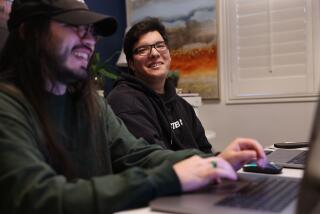The Southern California Job Market : Making It Work : For People With Disabilities, Home May Be Where the Job Is
- Share via
When a terrible car accident in her college years destroyed her dreams of becoming a diplomat or an anthropologist, Anne Hart of San Diego was forced to reassemble her life.
Plagued with chronic dizziness and other difficulties, Hart found herself unable to function in a 9-to-5 work environment. Her solution, which she now recommends to other people with disabilities, was to turn the tables, employment-wise.
Instead of Hart going to the workplace, she arranged for the workplace to come to her.
Now 52 and a successful writer in several genres--including books on job searching--Hart’s proudest boast is that she has never held a “real” job. “It’s a matter of taking action rather than reaction,” said Hart, who also writes under the name Anne deSola Cardoza.
To Hart, working at home has several advantages: You can make your own hours, dress as you please and escape the stereotypes that--liberation movement or not--still haunt the workplace.
“There are a lot of mental blocks to employers hiring the handicapped,” Hart said. “They think we pose the greatest risk because the stress of the job will make us fall apart. If you work at home, that isn’t a problem.”
Of the 49 million Americans classified by the Census Bureau as disabled, no one knows for sure how many are working at home. But labor experts think the number is growing, just as the number working at home is growing in the general population. Some 40 million people in the United States work full or part time at home, either in their own businesses or for employers.
People with disabilities have long been involved in home businesses and take-home work. The information superhighway is paving the way for even more telecommuting and virtual-reality offices.
“There is a lot of exciting stuff going on with people working out of their homes,” said Cynthia Jones, publisher of San Diego-based Mainstream magazine, a 15,000-circulation monthly publication for the “able-disabled.”
An article in Mainstream details a number of the possibilities: paralegal work, word processing, medical transcription, legal transcription, medical billing, computer researching, letter writing--in short, any chore that can be done with a computer, a fax machine, software and maybe voice mail.
“The possibilities are almost endless,” free-lance writer Joseph Chamberlain said in Mainstream. “You could even develop a small income by preparing computerized Tarot card readings, monthly horoscopes or biorhythm charts. Other possibilities include recipe collections, videotape databases, genealogy reports and gardening statistics.”
Private firms and community colleges offer classes in computer skills for those with disabilities and sub-specialties such as medical transcription. Training, and in some cases equipment, is available through the state’s vocational rehabilitation program.
There is a caveat in all this, however.
Although Jones is upbeat about the idea of people working at home, she would not like to see employers use home employment as a way around the new federal Americans With Disabilities Act, which requires, among other things, that workplaces be designed to fit needs of people with disabilities.
Only when those people and able-bodied people work together will the stereotypes and prejudices be broken down, Jones said.
“If the office can be made accessible, it should be,” she said. “I would hate to see the lack of interaction” between the two groups.
Marti Gacioch, 45, who has had severe arthritis since childhood, decided five years ago she wanted to work at home in Cardiff, a seaside town north of San Diego. She started Graphic Language, which offers graphics, typesetting and public relations services.
She offers two words of advice: niche and network.
“You have to find something you offer better than anybody else, or at least as well as other people,” she said. “You have to get out there and talk to a lot of people” to get business.
More to Read
Inside the business of entertainment
The Wide Shot brings you news, analysis and insights on everything from streaming wars to production — and what it all means for the future.
You may occasionally receive promotional content from the Los Angeles Times.










